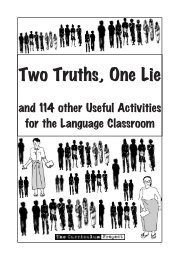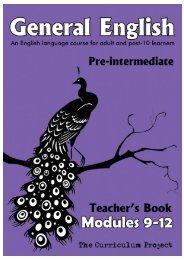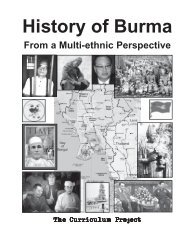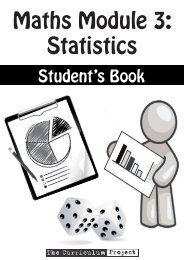Teacher's Guide - The Curriculum Project
Teacher's Guide - The Curriculum Project
Teacher's Guide - The Curriculum Project
- No tags were found...
You also want an ePaper? Increase the reach of your titles
YUMPU automatically turns print PDFs into web optimized ePapers that Google loves.
14. Economic SystemsGroupwork1. Put the students into groups of 3-5. Ask them to discuss and write down ideasfor a few minutes. <strong>The</strong>n elicit ideas from each group in turn and check agreementwith the rest of the class.Pre-teach: to interfere (verb): to involve yourself in something to try to influence it; allocation(noun): sharing out; unique (adj): different from all the others.Ask students to read the text about ‘Inflation indicators’. <strong>The</strong>y should write downany words that they don’t know. Elicit these words. Ask if they, or other students,can guess the meaning. If not, give them a dictionary to look it up and tell theclass, or tell them yourself. Check their understanding of the text.Groupwork2. Give students 5-10 minutes to look through the information on their own. <strong>The</strong>nsplit them into groups of 3-5 people and make them close their books so that theycannot see the information. Write the quiz on the board and ask each group tocomplete it together on paper. Give them about 15 minutes to complete it.a. In a planned economy, private individuals and businesses usually make the economicdecisions. True or False? If false, give the correct answer. (2 points)Answer: False. In a planned economy, the government takes the economic decisions.b. In a mixed economy, private businesses do not decide how to produce goods and services.True or false? If false. give the correct answer. (2 points)Answer: False. In a mixed economy, private businesses and governments share decisions onhow to produce goods and services.c. In a free market economy, the government has no control over economic decisions.True or false? If false, give the correct answer. (2 points)Answer: False. In a free market economy, private businesses and individuals usually make theeconomic decisions, but the goverment sometimes makes them, too.d. What are the four basic economic decisions that all countries have to make? (6 points)1. What (and how many) goods and services to produce.2. How to produce the goods and services.3. Who should receive the goods and services, and how many.4. How much goods, services and labour should cost.After 15 minutes, get each group to exchange their answer papers with anothergroup. <strong>The</strong>n elicit the answer to question (a) from one group. Check with theclass they are correct, and confirm the answer on the board. Elicit the answerfor (b) from another group., and check with the class. Continue with this patternwith (c) and (d). Ask each group to add up the marks on the sheet they arecorrecting, and then collect the scores to see which group received the most.Note: grammar and spelling are not so important, the ideas are very important.<strong>The</strong> <strong>Curriculum</strong> <strong>Project</strong> ECONOMICS: an introduction - Teacher’s <strong>Guide</strong>47













![[Eng] Nov 2012 DRAFT - The Curriculum Project](https://img.yumpu.com/45590859/1/184x260/eng-nov-2012-draft-the-curriculum-project.jpg?quality=85)


